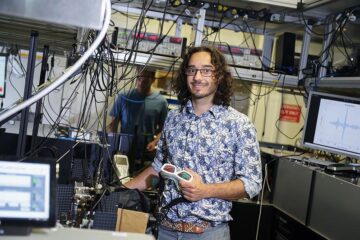Research into happiness is among the winners at European science awards

Ms Corrado received one of five „Marie Curie Excellence Awards“, which recognise excellent researchers who have participated in the EU's researcher exchange programme. Awards were also given recognising excellence in multinational research teams and in science communication.
The winners were selected by three separate Grand Juries, one for each category, composed of leading figures from European and international science. They share an award fund of almost €2m.
Janez Potoènik, European Commissioner for Science and Research, who presented the awards, said „These awards represent the best that Europe has to offer. They honour qualities that are important for all scientists, researchers, inventors and science communicators – excellence, openness and creativity“.
Other projects honoured at the event included the EPICA project, which has vastly extended our understanding of the Earth's climate over the last 800,000 years; VIRLIS which has advanced the knowledge needed to fight the listeria infection; and SynNanoMotors, developing molecular-sized motors, technology which could have myriad applications in the future. All these projects were awarded the prestigious Descartes Prize for Transnational Collaborative Research.
A documentary on the 96% of our universe that could be missing was one of 3 recipients of the Science Communication Prize, the others being the science communicator Jean-Pierre Luminet and writer Delphine Grinberg .
Alongside Luisa Corrado, other recipients of the Marie Curie Excellence award covered issues as diverse as the roles of genes in cancers, ultra-thin carbon films for use in consumer electronics, dark energy and the role of small molecules in the body's immune response.
Media Contact
Alle Nachrichten aus der Kategorie: Förderungen Preise
Neueste Beiträge

Neue universelle lichtbasierte Technik zur Kontrolle der Talpolarisation
Ein internationales Forscherteam berichtet in Nature über eine neue Methode, mit der zum ersten Mal die Talpolarisation in zentrosymmetrischen Bulk-Materialien auf eine nicht materialspezifische Weise erreicht wird. Diese „universelle Technik“…

Tumorzellen hebeln das Immunsystem früh aus
Neu entdeckter Mechanismus könnte Krebs-Immuntherapien deutlich verbessern. Tumore verhindern aktiv, dass sich Immunantworten durch sogenannte zytotoxische T-Zellen bilden, die den Krebs bekämpfen könnten. Wie das genau geschieht, beschreiben jetzt erstmals…

Immunzellen in den Startlöchern: „Allzeit bereit“ ist harte Arbeit
Wenn Krankheitserreger in den Körper eindringen, muss das Immunsystem sofort reagieren und eine Infektion verhindern oder eindämmen. Doch wie halten sich unsere Abwehrzellen bereit, wenn kein Angreifer in Sicht ist?…





















